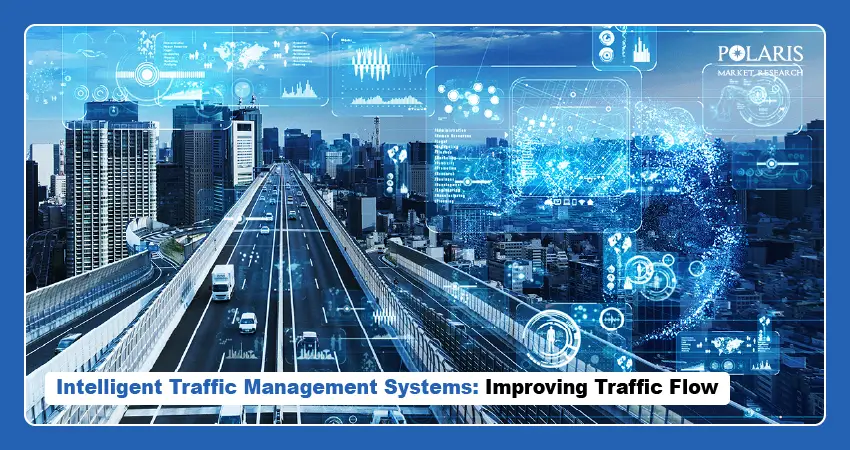Intelligent Traffic Management Systems: Improving Traffic Flow

There has been a rise in the number of personal and commercial vehicles globally. As such, tracking and regulating the movement of vehicles using traditional methods is challenging. Traffic authorities worldwide are increasingly turning to intelligent traffic management system.
Intelligent traffic management systems are designed for replacing the manual process of tracking and analyzing vehicle movements. In this blog post, we explain to you the essentials of these systems and their working. The key stats for the intelligent traffic management system market and the impact of artificial intelligence (AI) on the market landscape have also been detailed.
What Are Intelligent Traffic Management Systems?
Intelligent traffic management systems are advanced technologies. These systems aim at improving the safety and efficiency of transportation systems. They make use of advanced algorithms, communication networks, and real-time data for this. Various sensors, cameras, and other technologies are there in place for collecting information about traffic flow and weather conditions. The analysis of the information is then done for making adjustments to traffic lights and road signage.
Did You Know?
Rising urbanization and increasing density of vehicles in metropolitan areas have increased traffic congestion and made commute times longer. Growing government investments in smart cities and intelligent transportation projects is also contributing to the intelligent traffic management system market expansion.
Our latest market assessment reveals the intelligent traffic management system market to account for a CAGR of 14.9% from 2025 to 2034. The market is expected to reach USD 48.53 billion by 2034.
What Are Key Intelligent Traffic Management Components?
Intelligent traffic management makes use of several technologies for monitoring and responding to traffic conditions in real-time. The following components can be a part of these systems:
Video Detection Systems
These systems function as the vision of smart traffic infrastructure. Their installation is done at intersections and main corridors. They continuously monitor traffic density and the movement of vehicles. The instant detection of congestion and queue length by video detection systems help streamline the flow of traffic in urban settings. They also provide data for the optimization of traffic signals in real-time. These systems help improve traffic flow through the identification of patterns and anomalies.
Adaptive Traffic Signals Technology
Adaptive traffic signals technology makes use of real-time information for making adjustment to signal timing. The adjustments are made on the basis of the actual patterns of traffic. Using adaptive traffic signals technology, the prioritization of emergy vehicles and public transit can be made as required. The technology also helps reduce unnecessary delays and supports improved traffic signal timing.
V2X Communication
The automotive V2X communication market makes it possible for vehicles to share data with traffic signal networks in real-time. With V2X communication, drivers get warnings that allow them to avoid potential collisions and traffic violoations. Drivers also receive alerts about road hazards and approaching emergency vehicles. All of this creates a connected transportation ecosystem having improved mobility and safety.
What Are Intelligent Traffic Management System Benefits?
Improved Traffic Flow Efficiency
Solutions from the intelligent traffic management system market make use of real-time information for analyzing and optimizing the flow of traffic. These systems integrate data from various sources, including sensors, cameras, and GPS devices. The data is then used for monitoring traffic conditions in real-time. It also allows the systems to make intelligent decisions for the optimization of the timing of traffic signals. Advanced algorithms are then in place for processing the information and making adjustments to signal timings on the go. This proactive method of managing traffic helps reduce delays and the consumption of fuel.
Enhanced Safety and Reduced Accidents
Combining intelligent traffic management systems with advanced sensors helps improve road safety. Continuous monitoring of traffic conditions and identification of potential hazards allows these systems to detect anomalies. Automatic alert mechanisms and incident detection allow traffic authorities to quickly deploy emergency services. This can potentially save lives and reduce the severity of incidents. Furthermore, these systems are capable of optimizing signal timings for the prioritization of emergency vehicles.
Reduced Environmental Impact
Traffic congestion affects the daily lives of individuals residing in that area. It also results in increased air pollution and carbon emissions. Intelligent traffic management systems are important for the mitigation of these environmental impacts. The optimization of traffic flow and reduction in idle times at intersections enabled by these systems helps alleviate congestion. This reduces the consumption of fuel and lowers greenhouse gas emissions. In addition, the smoother traffic flow prompted by these systems allows for more efficient use of alternative transportation modes.
Integration with Smart City Infrastructure
Intelligent traffic management systems are a key element of the smart cities market. The integration of these systems with other urban infrastructure systems makes more comprehensive urban mobility solutions possible. The exchange of data between several smart city components in real-time offers a more holistic view of the urban environment.
How AI is Transforming Intelligent Traffic Management Systems?
AI allows for the continuous monitoring of traffic through sensors and cameras into smart city infrastructure. The data is analyzed by machine learning algorithms for analyzing patterns. Computer vision systems powered by AI are capable of automation incident detection. They can trigger instant alerts to control systems and allow for rapid emergency response. AI-based systems help reduce carbon emissions by reducing congestion and idle time.
Conclusion
Intelligent traffic control systems are changing urban mobility. The use of these systems is making traffic management and flow optimization easy. They are also improving road safety and reducing environmental impact. As cities continue to grow, the adoption of intelligent traffic management systems is becoming increasingly crucial. The intelligent traffic management system market is witnessing increased investments in advanced technologies and growing partnerships to make solutions more scalable and efficient.

